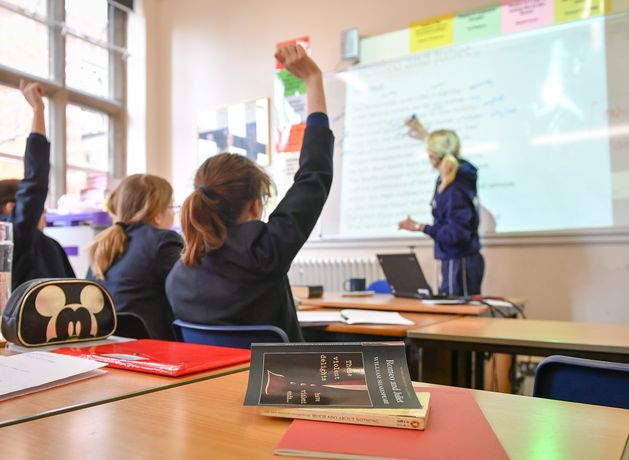The stark finding came in a survey of over 1,000 education professionals by the Teachers’ Union of Ireland (TUI) in advance of their annual conference which opens in Wexford on Tuesday.
TUI president David Waters warned that the findings of the study are “alarming” for the sector which has been in crisis over teacher recruitment and retention, burn-out amongst staff due to stress and workload issues and mounting concern over the impact of senior cycle changes and the advent of Artificial Intelligence.
Today’s News in 90 Seconds – April 21st
The study found that just 26pc of young teachers employed since 2015 received a full hours contract upon initial appointment.
Some 78pc of teachers who entered the profession before 2015 admitted they could not afford to enter the profession today due to income and cost of living challenges.
A total of 1,038 TUI members were surveyed for the study between March 21 and April 11.
Mr Waters warned that the crisis facing the Irish education sector is escalating and needs urgent Government action.
“Students lose out the most as a result of teacher shortages with larger class sizes and less access to the full breadth of subjects, but the Government still refuses to grasp the nettle and the crisis is worsening,” he said.
“Our survey results show that of those employed since 2015, just 26pc received a contract of full hours upon initial appointment, while just 11pc were offered a permanent position upon initial appointment.”
“This is completely unacceptable at a time when the sector is experiencing a recruitment and retention crisis. Improved teaching allocations are required at second level to ensure that more than fragments of jobs can be offered.”
The TUI president said the high rate of older teachers admitting they could no longer afford such a career for themselves was a major red-flag for everyone in the education sector.
“It is alarming in the extreme that 78pc of those who entered the profession before 2015 said that they could not afford to become a teacher today given impediments such as the accommodation crisis and having to survive on contracts of low hours,” he said.
“The extension of the Professional Master in Education (PME) to a two-year programme since 2014 has severely limited access to the profession for many in our society, who cannot afford to get into significant debt to pursue their ambition of teaching.
“It is also a worry that one in three recent appointments would consider leaving Ireland to teach in another country.”
TUI officials are also worried that the study underlined major concerns over the new senior cycle changes – and the lack of resources allocated to ensuring the changes are a success.
“The effects of a generation of underinvestment in our education system on school facilities is laid bare in the findings,” Mr Waters said.
“A majority (56pc) do not believe that their school has the required facilities for student project work as part of the redeveloped senior cycle, while half believe that their school does not have the required laboratory facilities for the revised Biology, Physics and Chemistry specifications which will be introduced from September.”
“It is also utterly unacceptable that 67pc do not believe that their school has the required support to assist all students in the school with special educational needs.”
Last week a major ASTI study highlighted alarming levels of burn-out amongst school leaders because of excessive workload.
The TUI survey echoed the same findings.
“Some 89pc believe that bureaucratic or administrative workload deflect from their core role of teaching, while 91pc believe that this burden has increased since they began their career,” Mr Waters said.
“A majority believe that such duties are not of benefit to teaching and learning in their schools.
“Three out of every four respondents believe that the so-called ‘Croke Park’ hours are not of value to school communities. At a time when teachers are leaving the profession for other employments, we need to ensure that they are given the freedom to teach and not demoralised by form-filling and box-ticking.”
The TUI study also found major concerns over the advent of AI.
“There is growing concern at a lack of adequate guidelines and training on AI particularly in the context of senior cycle redevelopment,” he said.
“Some 85pc believe that AI poses a threat to fairness, particularly in relation to assessments, while 86pc believe it would be difficult to differentiate between what is a student’s own work and what has been generated by AI.
“Around 93pc believe that the Department of Education/DFHERIS need to provide training to teachers (about) the area, while 95pc believe that more information and guidelines are required.”
The study also found that 64pc of teachers do not believe there are enough posts of responsibility within schools to match educational needs.
Further, 69pc of teachers believed the CAO system needed to be overhauled for the benefit of students.
#80pc #veteran #teachers #warn #afford #enter #profession #today








